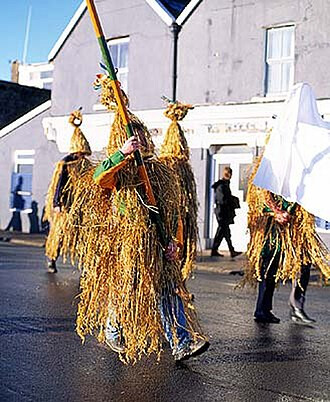In Europe, the day after Xmas is celebrated. And again, they align the memory of a disciple with pagan rituals. Saint Stephen's Day marks the second day in Christmastide (the 12 days of Christmas). "St. Stephen's Day" is celebrated on Dec. 26th in Western Europe; and on the 27th in Eastern Europe.
December 26 is also known known as Boxing Day in the UK. Though it originated as a holiday to give gifts to people in need, today Boxing Day forms part of Christmas celebrations, with many people choosing to take advantage of Boxing Day sales (market-system). It originated in the UK and is celebrated in several Commonwealth nations.
The European tradition of giving money and other gifts to those in need, or in service positions, has been dated to the Middle Ages, but the exact origin is unknown; it may reference the alms box of Christian churches to collect donations for the poor. The tradition may come from a custom in the late Roman era wherein alms boxes placed in churches were used to collect special offerings tied to the Feast of Saint Stephen which, in the Western Christian Churches.
In Ireland, it is called Lá Fhéile Stiofáin or Lá an Dreoilín, meaning the Wren Day. This name alludes to several legends, including those found in Irish mythology, linking episodes in the life of Jesus to the wren. Celtic mythology considered the wren a symbol of the past year. Wrenboys would go from house to house in the countryside collecting money, but in the towns the groups were more organised, and there was often an element of faction-fighting. In both cases, there would be a Wren Captain (usually wearing a cape and carrying a sword), musicians, and people wearing disguises, including straw costumes (worn by "strawboys"), blackened faces, and dressed as old women [Cross-dressing is against God's Law – Deut. 22:5]. It is a day of wild revelry, and people usually use their disguises to play tricks on their friends.
Note - The Tribe of Dan, who is known for its paganism, isn't mentioned in Revelation 7:1-9 concerning the 144,000 Chosen.
This video is another example to the mesh of pagan and xmas traditions:
Pagan Myth Aside - Who was Stephen?
Let's strip the Christian veneer, which was instigated by the Roman Catholic Church, and the ridiculous celebrations of every martyr - which is just a reason to "party"; and look at who Stephen was. And given the kind of man Stephen was, he would hate this day "dedicated" to him.
Acts 6:5 And the saying pleased the whole multitude: and they chose Stephen, a man full of faith and of the Holy Spirit, and Philip, and Prochorus, and Nicanor, and Timon, and Parmenas, and Nicolas a proselyte of Antioch:
Acts 6:5 introduces a faithful man of God named Stephen: “a man full of faith and of the Holy Spirit.” It is noteworthy that there have always been those faithful believers whose love for and commitment to the Lord seem to shine through so greatly that others around them notice, and Stephen was such a man. Nothing is known about the personal life of Stephen; however, what is known about him is what is truly important. He was faithful, even when faced with certain death.
Stephen was one of the seven men chosen to be responsible over the distribution of food to widows in the early church after a dispute arose and the apostles recognized they needed help. He was also "full of God’s grace and power, performed great wonders and signs among the people".
Opposition arose, but the men who argued with Stephen were no match for the wisdom given him by the Holy Spirit. So, the men decided to falsely accuse Stephen, labeling him a blasphemer and having him arrested (Acts 6:11-14).
Acts 7 is the record of Stephen’s testimony, which is perhaps the most detailed and concise history of Israel and their relationship to God of any in Scripture. Stephen was not concerned about his earthly existence, determining instead to stand firmly on the side of Jesus Christ, no matter the consequences. God inspired him to speak boldly, rightly accusing Israel of their failure to recognize Jesus, their Messiah, rejecting and murdering Him, as they had murdered Zechariah and other prophets and faithful men throughout their generations. Stephen’s speech was an indictment against Israel and their failure as the chosen people of God who had been given the law, the holy things, and the promise of the Messiah. Naturally, these accusations, though true, were not well received by the Jews.
In his speech, Stephen reminded them of their faithful patriarch, Abraham, and how God had led him from a pagan land into the land of Israel, where He made a covenant with him. He spoke of the journey of his people, through Joseph’s sojourn in Egypt to their deliverance by Moses 400 years later. He brought to mind how Moses had met God in the wilderness of Midian in a burning bush, and he explained how God had empowered Moses to lead His people from idolatry and slavery to freedom and times of refreshing in the Promised Land. Throughout his speech, he repeatedly reminded them of their continual rebellion and idolatry, in spite of the mighty works of God to which they were eyewitnesses, thereby accusing them with their own history, which only irritated them until they did not want to hear any more.
Acts 7:55-56 records his final moments of earthly life, just before he stepped through the veil between heaven and earth: “But Stephen, full of the Holy Spirit, looked up to heaven and saw the glory of God, and Jesus standing at the right hand of God. ‘Look,’ he said, ‘I see heaven open and the Son of Man standing at the right hand of God.’”
The above was actually from Got Question?, which I found nicely written.
Stephen in Acts Chapter 6-8. - King of kings' Bible

